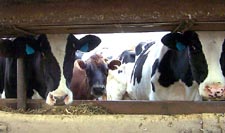Falling Milk Prices Challenge Farmers to Find Ways to Increase Income
Falling Milk Prices Challenge Farmers to Find Ways to Increase Income

With a continuing decline in milk prices the past several months – as much as $3 less a hundredweight below last year’s prices – many Kentucky dairy farmers may be considering cutting their production costs to lessen the financial impact. But Jack McAllister, dairy specialist for the University of Kentucky Cooperative Extension Service, recommends that they also consider trying to increase their income.
“We should look at our costs,” McAllister said, “but we should also look at the money we’re spending to see if we’re getting a return for that money. Maybe there are some things we can change in our operation that can help us get a better return.”
Things such as improving the quality of milk produced. Because many milk handlers – those who buy milk from dairy farmers – pay premiums for milk that meets certain quality standards, the most important thing farmers can do to increase their income is identify the cows whose milk falls short of those standards, McAllister said.
“There may be a few cows in the herd that are keeping the whole herd from meeting that quality standard,” he said. “Those cows need to be identified.”
To aid farmers in determining milk quality and assessing individual cow performance, McAllister continually encourages them to participate in the Dairy Herd Improvement Association record-keeping program, a nationwide, fee-based product testing and information gathering system. In short, DHI helps farmers keep records that “identify what’s going on with their herd of cattle,” McAllister said.
“Not only the milk production, but all of the records that are kept as part of the DHI system reflect the performance of the cows in a herd,” he said. “Testing the sample of an individual cow may provide the information that removal of one cow might allow the whole herd’s output of milk to earn a quality premium. …Depending on the size of the herd and the production level, this could amount to hundreds of dollars of additional income in a month.”
That’s despite the $1 to $2 per cow, per month cost associated with records collecting and testing provided through the DHI program.
“While there is a cost, they (DHI records) can provide important information on cows, which can have financial implications for both costs and returns,” McAllister said.
Keeping accurate and up-to-date records, such as those provided by the DHI program, may also enable dairy farmers to see other “positive management changes” they might be able to make to increase income, McAllister said.
“The records that we talk about – DHI (production) records but also financial records – basically can help us examine our business and see what our costs are and what our returns are. They help us see if there are places where we might be able to get greater returns for the money we’re already spending or where we’re spending too much money for the return that we’re getting,” he said.
While McAllister emphasizes increasing income, especially during times of declining milk prices, he understands the farmers’ “first instinct” to cut costs. The DHI program can also provide valuable information to aid cost-cutting efforts, he said. For instance, the program provides information on a cow’s production level and, therefore, can identify areas, such as feed, in which costs can be cut.
“There are some cows whose milk production doesn’t justify the feed that they’re eating,” he said. “Those cows need to be looked at. Maybe a cow is a candidate for culling and can be replaced by a younger animal that’s ready to come into the herd and be a higher milk producer.”
The bottom line during lean times is for dairy farmers to “manage around” the situation, McAllister added.
“The cows and the dollars are inseparably linked,” he said. “I recognize the difficult financial circumstances that lower milk prices create for dairy farmers. But you manage around the things you can’t change, and the things over which you have some direct influence you try to manage those directly.”
